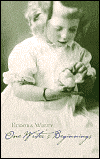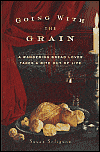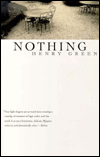 One Writer's Beginnings
One Writer's Beginnings, by Eudora Welty. What fresh bread is to a hungry stomach -- so simply and wonderfully delicious that it's hard to believe that just flour and water is all it takes to make it -- this book is to my hungry brain. There are very few writers who, when waxing poetic, don't lose their heads in the clouds; Welty is one of them. In her writing, passionate feeling is not an escape, but a sign that she is present fully in the thought she's expressing. She begins this book with a description of the clocks in her childhood house and ends it with train trips taken from home out into the wide world -- both real trips, which she took with her father to visit her grandparents, or by herself when she went to New York to show her stories and photographs to publishers, as well as a fictional one taken by one of her characters in
The Optimist's Daughter. These are wonderful ways to begin and to end, sweet and proper. I am astonished by her generosity and thoughtfulness as she puts together the stories of her parents' lives, surprised by her humor, heartened by her confidence and the clarity with which she sees her life purpose. She was in her seventies when she gave the lectures that became this book, and as I was reading my fear of growing old diminished, because if growing old can be this, this understanding and sharpness of vision that Welty shows on these pages, then it is something worth waiting and living for.

I have a habit of buying discounted books on subjects that intrigue me -- knots, the relationships between maids and their mistresses in eighteenth century England, the history of Russian literature -- and not reading them. This book,
Going with the Grain: A Wandering Bread Lover Takes a Bite out of Life, by Susan Seligson is the exception. I picked it up from my book shelves in an idle moment and was hooked from the first few pages. The writing is whimsical without being sloppy; the author's approach is one of intense curiosity but also common sense. You need common sense when you talk with bakers who speak of making bread like this: "[You have to use] only certified biodynamically grown wheat the cultivation and harvesting of which ensures not only the health of the soil but the 'creative shaping forces of the cosmos on the plant.'" The author quips: "I half expect London [the baker who said the above] to boast that the grain is irrigated with the tears of angels and the harvest cosummated by virgins under a full moon." She travels to Jordan and Ireland, to the Wonderbread factory in Maine, to New York and Alabama, India and France to watch how bread is baked and eaten; at the end of each chapter are recipes for traditional breads from all these places. It is fascinating to see how many variations on flour and water and salt (and only occasionally, to my surprise, yeast) there are in the world, and how these variations have sprung up from necessities imposed by geography and the spiritual lives of the peoples who prepare them. I'm inspired now to bake my own batch of homemade bread.

In the wrong mood,
Nothing by Henry Green is torturous to read. It contains, at most, two or three pages of expository writing; the rest of the pages, nearly two hundred, is dialogue punctuated very sparsely by tag lines (often, these taglines pack such a punch they stopped me in my tracks). Green repeatedly introduces the dialogue with only a sentence or two, permutations of "Mr./Mrs./Miss X invited Mr./Mrs./Miss Y for drinks/lunch/dinner at his/her flat/restaurant/favorite pub in Knightsbridge" -- this to me is wildly courageous thing for a writer to do. After such unassuming preambles, the Mr.'s and Mrs.'s and Misses talk and talk and talk, page after glorious page, about everything and nothing, mostly the latter. In the process they weave a most astonishing web of meanings, of relationships and personalities, of strong and weak wills battling each other with the grace of walruses, of cunning and naivete. And at the center of the web is this: "Oh but we shall never get at the whole truth. I often think we're not here below to find that out ever, till I believe the truth's even stopped having importance for me in the least. Which is not to say I go about all day telling lies myself, you're my witness! No I meant generally. But Philip darling do promise..." (I have not missed any commas in my copying; this is how the dialogue reads. I don't know whether to love it or hate it.) These are the words of the formidable Mrs. Weatherby whose special talent is that she always gets what she wants by convincing other people, who suspect nothing of her ploys, to give it to her of their own volition. It seems strange that a book like this, whose characters talk utterly mundane things (the quote above is one of two of their kind in the whole book), should be driven by
truth, an investigation of what truth is and isn't, can be and can't be. I fail to understand how this dialogue pulls me in with the vehemence it does. Well no, not really. Truth is the fuel that burns in this book's engine room, and that heat attracts me the way honey attracts flies.
 One Writer's Beginnings, by Eudora Welty. What fresh bread is to a hungry stomach -- so simply and wonderfully delicious that it's hard to believe that just flour and water is all it takes to make it -- this book is to my hungry brain. There are very few writers who, when waxing poetic, don't lose their heads in the clouds; Welty is one of them. In her writing, passionate feeling is not an escape, but a sign that she is present fully in the thought she's expressing. She begins this book with a description of the clocks in her childhood house and ends it with train trips taken from home out into the wide world -- both real trips, which she took with her father to visit her grandparents, or by herself when she went to New York to show her stories and photographs to publishers, as well as a fictional one taken by one of her characters in The Optimist's Daughter. These are wonderful ways to begin and to end, sweet and proper. I am astonished by her generosity and thoughtfulness as she puts together the stories of her parents' lives, surprised by her humor, heartened by her confidence and the clarity with which she sees her life purpose. She was in her seventies when she gave the lectures that became this book, and as I was reading my fear of growing old diminished, because if growing old can be this, this understanding and sharpness of vision that Welty shows on these pages, then it is something worth waiting and living for.
One Writer's Beginnings, by Eudora Welty. What fresh bread is to a hungry stomach -- so simply and wonderfully delicious that it's hard to believe that just flour and water is all it takes to make it -- this book is to my hungry brain. There are very few writers who, when waxing poetic, don't lose their heads in the clouds; Welty is one of them. In her writing, passionate feeling is not an escape, but a sign that she is present fully in the thought she's expressing. She begins this book with a description of the clocks in her childhood house and ends it with train trips taken from home out into the wide world -- both real trips, which she took with her father to visit her grandparents, or by herself when she went to New York to show her stories and photographs to publishers, as well as a fictional one taken by one of her characters in The Optimist's Daughter. These are wonderful ways to begin and to end, sweet and proper. I am astonished by her generosity and thoughtfulness as she puts together the stories of her parents' lives, surprised by her humor, heartened by her confidence and the clarity with which she sees her life purpose. She was in her seventies when she gave the lectures that became this book, and as I was reading my fear of growing old diminished, because if growing old can be this, this understanding and sharpness of vision that Welty shows on these pages, then it is something worth waiting and living for. I have a habit of buying discounted books on subjects that intrigue me -- knots, the relationships between maids and their mistresses in eighteenth century England, the history of Russian literature -- and not reading them. This book, Going with the Grain: A Wandering Bread Lover Takes a Bite out of Life, by Susan Seligson is the exception. I picked it up from my book shelves in an idle moment and was hooked from the first few pages. The writing is whimsical without being sloppy; the author's approach is one of intense curiosity but also common sense. You need common sense when you talk with bakers who speak of making bread like this: "[You have to use] only certified biodynamically grown wheat the cultivation and harvesting of which ensures not only the health of the soil but the 'creative shaping forces of the cosmos on the plant.'" The author quips: "I half expect London [the baker who said the above] to boast that the grain is irrigated with the tears of angels and the harvest cosummated by virgins under a full moon." She travels to Jordan and Ireland, to the Wonderbread factory in Maine, to New York and Alabama, India and France to watch how bread is baked and eaten; at the end of each chapter are recipes for traditional breads from all these places. It is fascinating to see how many variations on flour and water and salt (and only occasionally, to my surprise, yeast) there are in the world, and how these variations have sprung up from necessities imposed by geography and the spiritual lives of the peoples who prepare them. I'm inspired now to bake my own batch of homemade bread.
I have a habit of buying discounted books on subjects that intrigue me -- knots, the relationships between maids and their mistresses in eighteenth century England, the history of Russian literature -- and not reading them. This book, Going with the Grain: A Wandering Bread Lover Takes a Bite out of Life, by Susan Seligson is the exception. I picked it up from my book shelves in an idle moment and was hooked from the first few pages. The writing is whimsical without being sloppy; the author's approach is one of intense curiosity but also common sense. You need common sense when you talk with bakers who speak of making bread like this: "[You have to use] only certified biodynamically grown wheat the cultivation and harvesting of which ensures not only the health of the soil but the 'creative shaping forces of the cosmos on the plant.'" The author quips: "I half expect London [the baker who said the above] to boast that the grain is irrigated with the tears of angels and the harvest cosummated by virgins under a full moon." She travels to Jordan and Ireland, to the Wonderbread factory in Maine, to New York and Alabama, India and France to watch how bread is baked and eaten; at the end of each chapter are recipes for traditional breads from all these places. It is fascinating to see how many variations on flour and water and salt (and only occasionally, to my surprise, yeast) there are in the world, and how these variations have sprung up from necessities imposed by geography and the spiritual lives of the peoples who prepare them. I'm inspired now to bake my own batch of homemade bread. In the wrong mood, Nothing by Henry Green is torturous to read. It contains, at most, two or three pages of expository writing; the rest of the pages, nearly two hundred, is dialogue punctuated very sparsely by tag lines (often, these taglines pack such a punch they stopped me in my tracks). Green repeatedly introduces the dialogue with only a sentence or two, permutations of "Mr./Mrs./Miss X invited Mr./Mrs./Miss Y for drinks/lunch/dinner at his/her flat/restaurant/favorite pub in Knightsbridge" -- this to me is wildly courageous thing for a writer to do. After such unassuming preambles, the Mr.'s and Mrs.'s and Misses talk and talk and talk, page after glorious page, about everything and nothing, mostly the latter. In the process they weave a most astonishing web of meanings, of relationships and personalities, of strong and weak wills battling each other with the grace of walruses, of cunning and naivete. And at the center of the web is this: "Oh but we shall never get at the whole truth. I often think we're not here below to find that out ever, till I believe the truth's even stopped having importance for me in the least. Which is not to say I go about all day telling lies myself, you're my witness! No I meant generally. But Philip darling do promise..." (I have not missed any commas in my copying; this is how the dialogue reads. I don't know whether to love it or hate it.) These are the words of the formidable Mrs. Weatherby whose special talent is that she always gets what she wants by convincing other people, who suspect nothing of her ploys, to give it to her of their own volition. It seems strange that a book like this, whose characters talk utterly mundane things (the quote above is one of two of their kind in the whole book), should be driven by truth, an investigation of what truth is and isn't, can be and can't be. I fail to understand how this dialogue pulls me in with the vehemence it does. Well no, not really. Truth is the fuel that burns in this book's engine room, and that heat attracts me the way honey attracts flies.
In the wrong mood, Nothing by Henry Green is torturous to read. It contains, at most, two or three pages of expository writing; the rest of the pages, nearly two hundred, is dialogue punctuated very sparsely by tag lines (often, these taglines pack such a punch they stopped me in my tracks). Green repeatedly introduces the dialogue with only a sentence or two, permutations of "Mr./Mrs./Miss X invited Mr./Mrs./Miss Y for drinks/lunch/dinner at his/her flat/restaurant/favorite pub in Knightsbridge" -- this to me is wildly courageous thing for a writer to do. After such unassuming preambles, the Mr.'s and Mrs.'s and Misses talk and talk and talk, page after glorious page, about everything and nothing, mostly the latter. In the process they weave a most astonishing web of meanings, of relationships and personalities, of strong and weak wills battling each other with the grace of walruses, of cunning and naivete. And at the center of the web is this: "Oh but we shall never get at the whole truth. I often think we're not here below to find that out ever, till I believe the truth's even stopped having importance for me in the least. Which is not to say I go about all day telling lies myself, you're my witness! No I meant generally. But Philip darling do promise..." (I have not missed any commas in my copying; this is how the dialogue reads. I don't know whether to love it or hate it.) These are the words of the formidable Mrs. Weatherby whose special talent is that she always gets what she wants by convincing other people, who suspect nothing of her ploys, to give it to her of their own volition. It seems strange that a book like this, whose characters talk utterly mundane things (the quote above is one of two of their kind in the whole book), should be driven by truth, an investigation of what truth is and isn't, can be and can't be. I fail to understand how this dialogue pulls me in with the vehemence it does. Well no, not really. Truth is the fuel that burns in this book's engine room, and that heat attracts me the way honey attracts flies.


0 Comments:
Post a Comment
<< Home